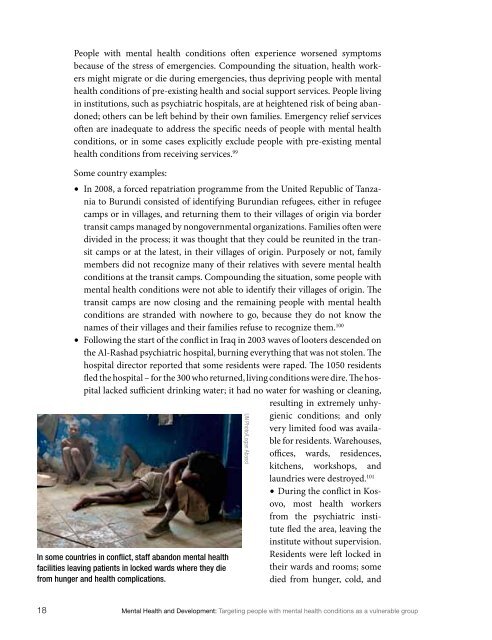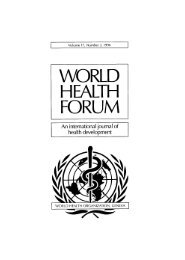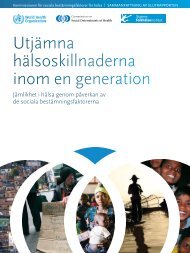MENTAL HEALTH AND DEVELOPMENT: - libdoc.who.int - World ...
MENTAL HEALTH AND DEVELOPMENT: - libdoc.who.int - World ...
MENTAL HEALTH AND DEVELOPMENT: - libdoc.who.int - World ...
Create successful ePaper yourself
Turn your PDF publications into a flip-book with our unique Google optimized e-Paper software.
People with mental health conditions often experience worsened symptoms<br />
because of the stress of emergencies. Compounding the situation, health workers<br />
might migrate or die during emergencies, thus depriving people with mental<br />
health conditions of pre-existing health and social support services. People living<br />
in institutions, such as psychiatric hospitals, are at heightened risk of being abandoned;<br />
others can be left behind by their own families. Emergency relief services<br />
often are inadequate to address the specific needs of people with mental health<br />
conditions, or in some cases explicitly exclude people with pre-existing mental<br />
health conditions from receiving services. 99<br />
Some country examples:<br />
• In 2008, a forced repatriation programme from the United Republic of Tanzania<br />
to Burundi consisted of identifying Burundian refugees, either in refugee<br />
camps or in villages, and returning them to their villages of origin via border<br />
transit camps managed by nongovernmental organizations. Families often were<br />
divided in the process; it was thought that they could be reunited in the transit<br />
camps or at the latest, in their villages of origin. Purposely or not, family<br />
members did not recognize many of their relatives with severe mental health<br />
conditions at the transit camps. Compounding the situation, some people with<br />
mental health conditions were not able to identify their villages of origin. The<br />
transit camps are now closing and the remaining people with mental health<br />
conditions are stranded with nowhere to go, because they do not know the<br />
names of their villages and their families refuse to recognize them. 100<br />
• Following the start of the conflict in Iraq in 2003 waves of looters descended on<br />
the Al-Rashad psychiatric hospital, burning everything that was not stolen. The<br />
hospital director reported that some residents were raped. The 1050 residents<br />
fled the hospital – for the 300 <strong>who</strong> returned, living conditions were dire. The hospital<br />
lacked sufficient drinking water; it had no water for washing or cleaning,<br />
resulting in extremely unhy-<br />
In some countries in conflict, staff abandon mental health<br />
facilities leaving patients in locked wards where they die<br />
from hunger and health complications.<br />
gienic conditions; and only<br />
very limited food was available<br />
for residents. Warehouses,<br />
offices, wards, residences,<br />
kitchens, workshops, and<br />
laundries were destroyed. 101<br />
• During the conflict in Kosovo,<br />
most health workers<br />
from the psychiatric institute<br />
fled the area, leaving the<br />
institute without supervision.<br />
Residents were left locked in<br />
their wards and rooms; some<br />
died from hunger, cold, and<br />
18 MentalHealthandDevelopment:Targetingpeoplewithmentalhealthconditionsasavulnerablegroup<br />
UN Photo/Logan Abassi

















